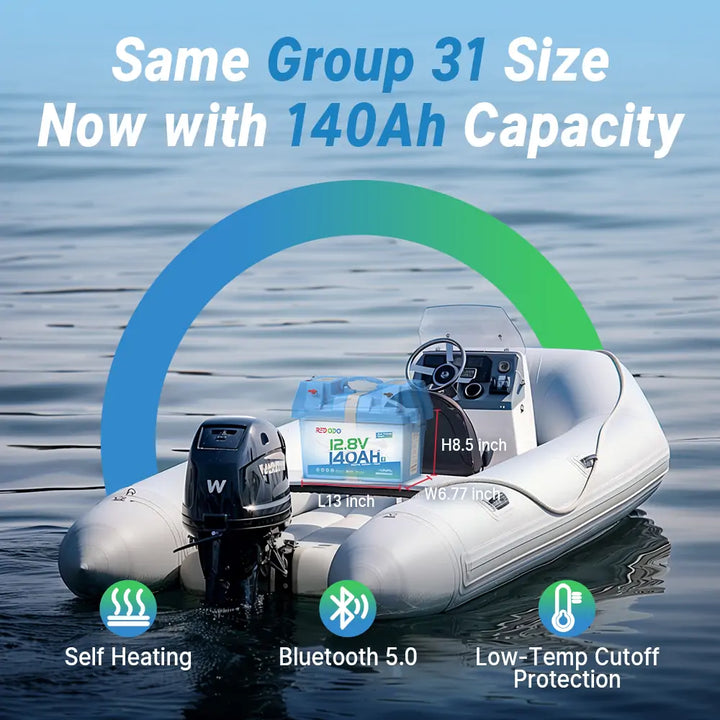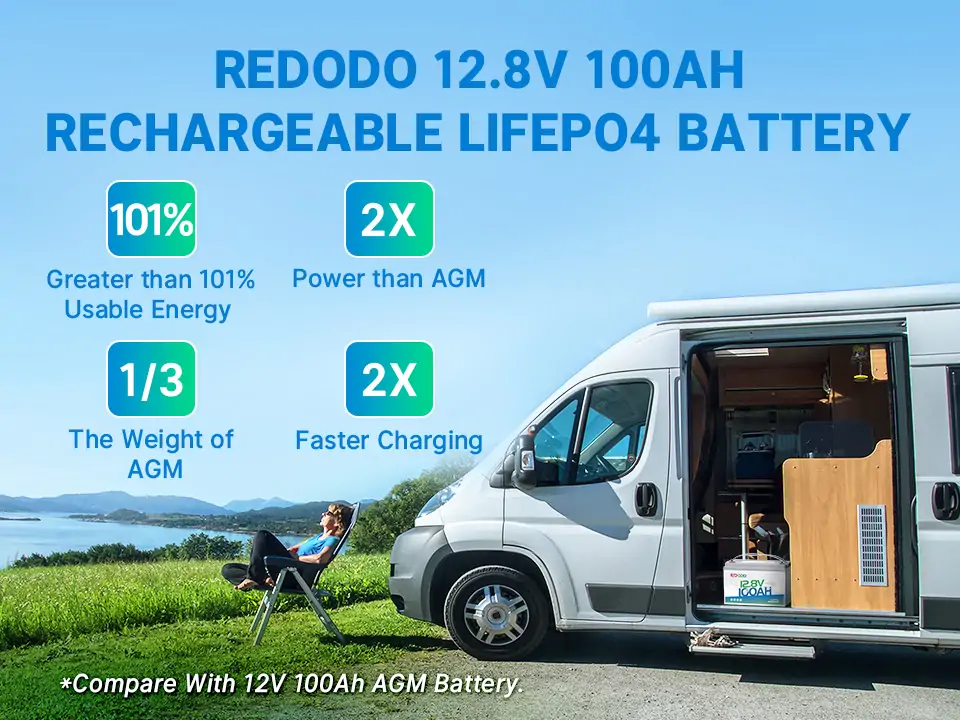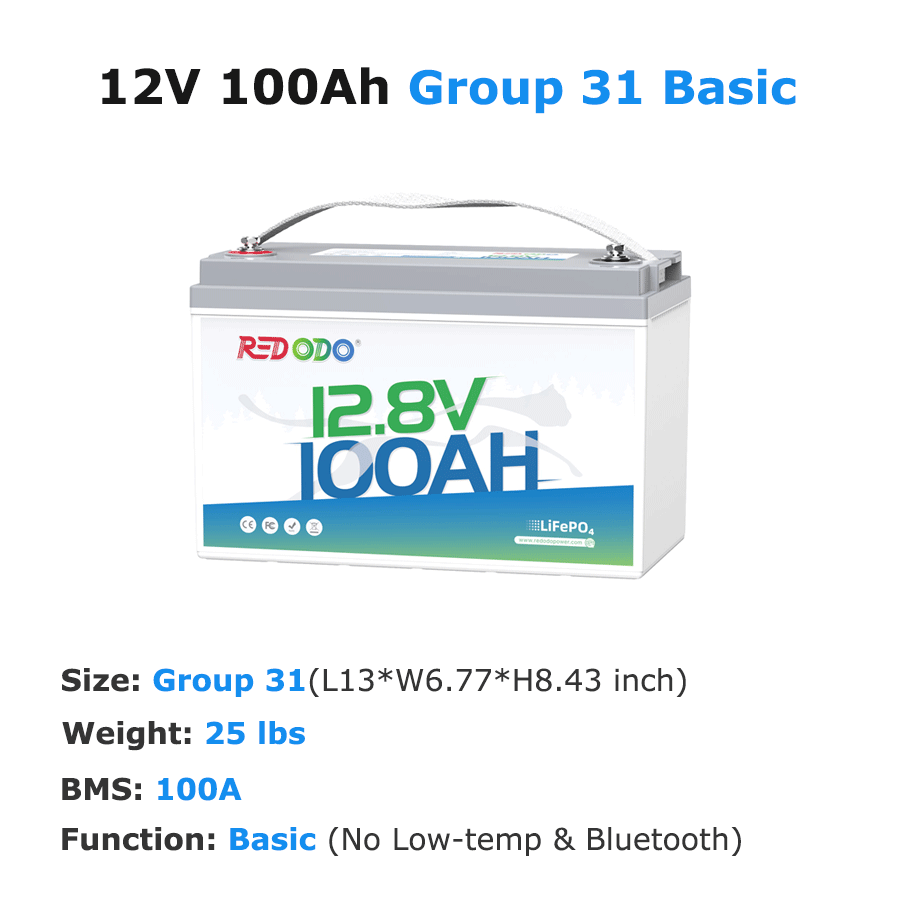In both marine and RV applications, deep cycle batteries play an essential role for running electrical systems. On boats, they supply power to trolling motors, onboard electronics, and other accessories after the engine has been started. In RVs, these batteries power lighting, appliances, and other electrical devices when the vehicle is off-grid or not plugged into shore power.
But is there a difference between a deep cycle marine battery and RV battery? In this guide, we'll explain what are deep cycle batteries, how deep cycle marine and RV batteries differ, and how to choose the best RV marine battery for your needs.
Table of Content
What are Deep Cycle Batteries?
Deep cycle batteries are specifically engineered for long-duration energy delivery and repeated discharge and recharge cycles. Unlike starter batteries, which are built to deliver a large burst of current for engine ignition, deep cycle batteries discharge slowly and can be deeply discharged, typically up to 80%-100% of their total capacity.
The deep cycle batteries are commonly used in:
- RVs, camper van, and motorhomes
- Boats and trolling motors
- Off-grid solar systems
- Golf carts and mobility scooters

Key Characteristics of Deep Cycle Batteries
Available in various chemistries (lead-acid, AGM, and lithium)
The common deep cycle battery types are FLA, AGM, and lithium, each offering unique advantages and preferences.
- Flooded Lead-Acid (FLA): The most traditional and budget-friendly deep cycle option. They use a liquid electrolyte and are known for their reliability and wide availability.
- AGM (Absorbent Glass Mat): A type of sealed lead-acid battery. They use a fiberglass mat to hold the electrolyte, making them spill-proof and more resistant to vibration.
- Lithium (LiFePO4): The most advanced and efficient deep cycle battery chemistry currently available. They offer unmatched performance, longevity, and energy efficiency comparing to FLA and AGM.
Thick battery plates for deeper discharge cycles
Deep cycle batteries have thicker, denser lead plates (in lead-acid types) or prismatic cells (in lithium models). These are designed to withstand deep discharges and repeated cycling without degradation. Thicker plates reduce the surface area, limiting the short bursts of energy typical in starter batteries but enhancing long-term energy delivery.
Designed for deep discharge
While regular starter batteries should not be discharged below 80–90% of their capacity, deep cycle batteries can regularly discharge up to 80% without significant damage. Lithium deep cycle batteries can handle even deeper discharges (up to 100%) with minimal wear.
Slow Discharge Rate
Deep cycle batteries self-discharge more slowly than starter batteries. Lithium batteries have the lowest self-discharge rate, losing only about 2-3% per month when not in use, compared to 5-15% for lead-acid types.
Deep Cycle Marine vs. RV Battery: What’s the Difference?
When comparing a deep cycle marine and RV battery, many people wonder whether there’s a real difference. The short answer is: not much, at least on the surface. Both marine and RV batteries often share similar chemistry and form factors, but the difference lies in how they are designed and used in their specific environments.
1. Purpose and Usage
Deep cycle marine batteries are built to withstand moist, corrosive environments and frequent vibrations for boats. Some marine batteries are dual-purpose, combining starting and deep cycle functionality, but true deep cycle models are ideal for powering trolling motors, fish finders, and onboard electronics.

Redodo 12V 140Ah Dual Purpose Lithium Battery
Deep cycle RV batteries are built for dry land and optimized to power off-grid living systems such as lights, fridges, and inverters. They don't face the same vibration or splash exposure that marine batteries do.
2. Design and Construction
Marine deep cycle batteries are engineered to endure the tough conditions found on the water. They typically feature higher waterproof rating, thicker internal plates and reinforced components to handle marine environments and occasional impacts.
RV batteries, while still robust, are primarily designed for stable, land-based environments. Their construction emphasizes long service life and low maintenance for consistent performance in powering onboard systems.
3. Performance in Specific Environments
Marine deep cycle batteries are specifically optimized to operate reliably in challenging marine settings. They are built to resist corrosion from saltwater, tolerate high levels of moisture, and function despite constant vibrations from boat engines or waves.
In contrast, RV batteries are made to handle the rigors of land travel, powering appliances, lighting, and electronics, while enduring frequent cycles of deep discharge and recharge. RV batteries are also typically compatible with solar power systems, making them ideal for off-grid camping and extended outdoor adventures.
4. Cost Considerations
Because of their higher waterproof rating and ability to withstand harsher environments, marine deep cycle batteries usually come at a higher price point. Their premium materials and construction reflect the demands of marine applications.
RV deep cycle batteries are generally more affordable, but they may not deliver the same durability or reliability if used in a marine setting. Ultimately, the cost should be weighed against the intended use, investing in the right battery for your environment ensures better performance and longer life.
Can I Use a Deep Cycle Marine Battery in My RV?
In fact, many 12V deep cycle batteries are labeled or marketed as “marine/RV batteries” because they can be used interchangeably in either setup, especially when the goal is to run household-style accessories and electronics.
Modern high-quality deep cycle LiFePO4 (Lithium Iron Phosphate) batteries like Redodo’s are ideal for both boats and RVs, because they offer:
- Lightweight Design: Up to 60% lighter than lead-acid
- Longer Lifespan: 4000+ cycles vs. 500 cycles (lead-acid)
- Faster Charging: Save time and energy
- Stable Performance: Even under heavy loads or in varying temperatures
- Built-in BMS (Battery Management System) for safety
At Redodo, we offer a wide range of lithium deep cycle batteries like our 12V 100Ah LiFePO4, which is perfect for marine and RV setups alike, providing reliable, long-lasting power in a compact, durable design.
How to Choose the Right Battery for Your Boat or RV?
Selecting the right battery for your boat or RV requires a good understanding of your power needs and how the battery performs in different conditions.
What to Consider When Choosing a Marine Battery
- Battery Purpose: Determine how the battery will be used—starting the engine, powering onboard electronics, or both. Marine starting batteries are designed to deliver a quick burst of power, while deep cycle batteries are made for long, steady energy delivery. Dual-purpose batteries can handle both tasks but may not perform as well as specialized types in each function.
- Power Requirements: Assess the total power demand from onboard equipment like trolling motors, fish finders, and lighting. These systems can draw significant current, so choose a battery with enough capacity to handle your typical usage duration.
- Vibration Resistance: Boats are constantly exposed to vibrations from engines and rough waters. Opt for batteries built to handle these conditions.
What to Consider When Choosing an RV Battery
- Space Constraints: RVs often have limited room for battery storage. Consider compact options like Group 24 or Group 31 lithium batteries, which offer high performance in a smaller footprint.
- Low Maintenance: If you prefer a hassle-free power solution, choose maintenance-free options like AGM or LiFePO4 batteries. These require no water checks or terminal cleaning, making them ideal for occasional RV users or those seeking convenience.
- Longevity: To reduce the frequency and cost of battery replacements, invest in long-lasting lithium batteries. These typically outlast traditional flooded or even AGM deep cycle batteries by a significant margin.
Conclusion: Deep Cycle Marine vs. RV Battery
When comparing deep cycle marine and RV batteries, the choice depends on your environment, power needs, and budget. Both types of batteries are designed for deep discharges, some marine batteries are tailored to wet, rugged conditions, while RV batteries focus on dry, off-grid living, and are compatible with solar setups.
For many users, especially those with crossover needs (like RVers who also boat), a lithium deep cycle battery offers the best of both worlds. If you're looking for the best RV marine battery, go for one like Redodo LiFePO4 batteries that offers durability, lightweight performance, and smart energy management.
FAQs About Marine and RV Battery
What type of battery is a deep cycle marine battery?
A deep cycle marine battery is typically a lead-acid battery (either flooded, AGM, or Gel) or a lithium battery (LiFePO4). Among these, lithium (LiFePO4) batteries are considered the best due to their longer lifespan, faster charging, lighter weight, and consistent performance.
Is a marine RV battery an AGM battery?
A marine RV battery can be an AGM (Absorbent Glass Mat) battery, but not all marine or RV batteries are AGM by default. AGM batteries are a type of sealed lead-acid battery that offers maintenance-free operation and better vibration resistance than flooded lead-acid, making them a popular choice for both marine and RV use. However, lithium deep cycle batteries are also common in these applications.
How long does a marine RV battery last?
The lifespan of a marine RV battery depends on its type, usage, and maintenance. On average:
- Flooded lead-acid batteries last 2–3 years.
- AGM or Gel batteries can last 3–5 years.
- Lithium (LiFePO4) batteries often last 10+ years or 4,000+ cycles with proper use.

Redodo

Redodo
Recent Post

Early Prime Day LiFePO4 Bettery Deals 2025: Top Discounts

12V 100Ah Battery vs 24V 100Ah Battery: Which is Better?

How Long Do 48 Volt Lithium Golf Cart Batteries Last?

What is the Best Lithium Battery for Trolling Motor?



![⚡[Final $387] Redodo 12V 200Ah Plus Deep Cycle Battery | 2560W Load Power | For Solar Home, RV, Marine](http://www.redodopower.com/cdn/shop/files/12V-200ah-plus_1b0f0488-b518-4050-9fab-5ec64e6b5fcc.jpg?v=1750757619)
![⚡[Final $201] Redodo 12V 100Ah LiFePO4 Lithium Battery | Best Budget | For RV, Solar, Trolling Motor](http://www.redodopower.com/cdn/shop/files/12v-100ah_37ccaa13-da19-4e1a-b2f9-51cdea260671.jpg?v=1750753609)
![⚡[Final $211] Redodo 12V 100Ah Group 24 Deep Cycle LiFePO4 Lithium Battery | For Home, RV, Marine](http://www.redodopower.com/cdn/shop/files/12V-100ah-group-24_b7af878e-8647-4f1b-a8c8-1b5635120796.jpg?v=1750754252)
![⚡[ONLY $211] Redodo 12V 100Ah Lithium Trolling Motor Battery With Low Temp Protection](http://www.redodopower.com/cdn/shop/files/12V-100ah_9b9f3948-80bd-4a78-a159-164279a5b4f5.jpg?v=1750820399)
![⚡[Final $377] Redodo 12V 200Ah Lithium LiFePO4 Battery | 1280W Load Power | For RV, Solar, Off-Grid](http://www.redodopower.com/cdn/shop/files/12V-200ah_d8ae9764-32c8-4829-b88c-d78f9680f0b5.jpg?v=1750820224)
![⚡[Final $460] Redodo 12V 140Ah Dual Purpose Marine Battery, 1000 CCA | For Marine, Trolling Motor, RV](http://www.redodopower.com/cdn/shop/files/12V-140ah_b800de33-d7ed-4f41-9296-2cf7b91e405d.jpg?v=1750757314)

![⚡[Final $230] Redodo 12V 100Ah Mini Bluetooth LiFePO4 Battery | For RV, Marine, Solar](http://www.redodopower.com/cdn/shop/files/12v100ah-mini.jpg?v=1750754725)
![⚡[Final $135] Redodo 12V 50Ah Lithium LiFePO4 Battery | For Portable Solar Power Stations, Camping, RV](http://www.redodopower.com/cdn/shop/files/12V_50Ah_Battery.jpg?v=1744710635)
![⚡[Final $184] Redodo 12V 20Ah LiFePO4 Marine Cranking Battery, 800CCA(-10℃)](http://www.redodopower.com/cdn/shop/files/20ah_65d2927b-00b5-49d7-b12a-56c4536a0b2d.jpg?v=1750839374)
![⚡[$225 for 48hrs] Redodo 12V 100Ah Group 31 Bluetooth Lithium Battery | Real-Time Battery Monitoring | For RV, Marine, Solar](http://www.redodopower.com/cdn/shop/files/12v-100ah-group-31-bluetooth.jpg?v=1751015853)
![⚡[ONLY $271] Redodo 12V 140Ah Group 31 Lithium Battery with Bluetooth | 40% More Capacity | For RV, Marine, Solar Home](http://www.redodopower.com/cdn/shop/files/Redodo-12V-140ah-bluetooth-battery.jpg?v=1751014000)

![⚡[Final $230] Redodo 12V 100Ah Group 24 Bluetooth LiFePO4 Battery | Real-Time Battery Monitoring | For RV, Marine, Solar](http://www.redodopower.com/cdn/shop/files/12v-100ah-group-24_59522e7a-7378-4bc0-9389-d2e35b3f28fd.jpg?v=1750754437)